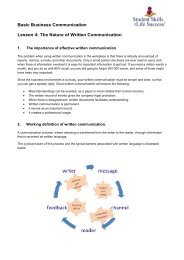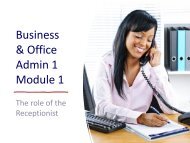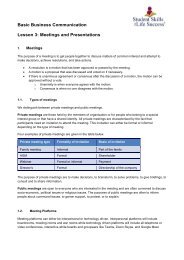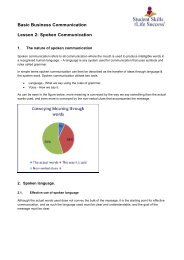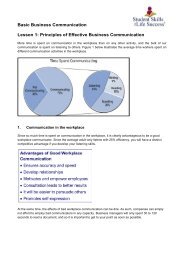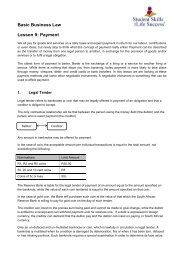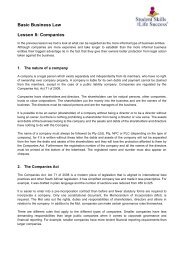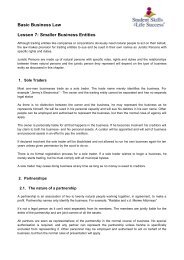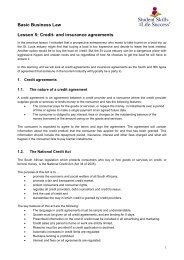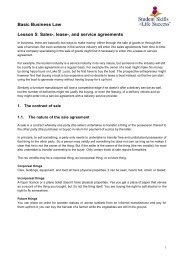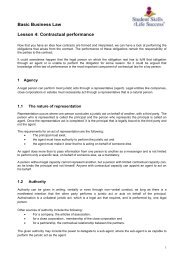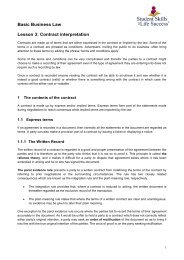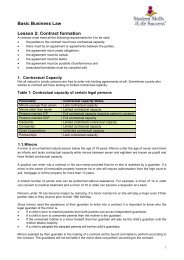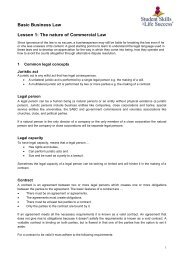Student Skills for Life Success: Basic Study Skills: Workshop Manual
This is the student workbook for the "Basic Study Skills" workshop as offered by "Student Skills for Life Success. The workshop is directed at children 11 years and older, but anyone struggling to study will benefit. The workbook is handy on its own, but those who attend a face-to-face, or online workshop will get the most reward, due to the interactive nature of the workshop. Workshops are delivered as two 2-hour sessions on consecutive days.
This is the student workbook for the "Basic Study Skills" workshop as offered by "Student Skills for Life Success. The workshop is directed at children 11 years and older, but anyone struggling to study will benefit. The workbook is handy on its own, but those who attend a face-to-face, or online workshop will get the most reward, due to the interactive nature of the workshop. Workshops are delivered as two 2-hour sessions on consecutive days.
You also want an ePaper? Increase the reach of your titles
YUMPU automatically turns print PDFs into web optimized ePapers that Google loves.
<strong>Basic</strong><br />
<strong>Study</strong>-<strong>Skills</strong><br />
<strong>Workshop</strong><br />
Name: _________________<br />
Surname: _________________<br />
Grade: _________________<br />
School: _________________
Session 1<br />
1<br />
The <strong>Study</strong> Process<br />
2<br />
<strong>Study</strong> Attitudes<br />
3<br />
<strong>Study</strong> Environment<br />
4<br />
Roles & Responsibilities<br />
5 The art of Note-making
The <strong>Study</strong> Process<br />
PLAN Be<strong>for</strong>e and during class.<br />
Plan - Listen Attentively -<br />
Notes<br />
Phase 1 - Be<strong>for</strong>e Class<br />
• Read through the work you<br />
will be doing in class<br />
Phase 2 - During Class<br />
• Attend class<br />
• Ask questions<br />
• Participate in discussions<br />
• Follow the instructions<br />
• Confirm your understanding<br />
• Know what will be tested &<br />
• How questions will be asked<br />
RaP Be<strong>for</strong>e testing<br />
Revise and Apply<br />
Phase 4 - Be<strong>for</strong>e testing<br />
• Join a study group<br />
• Start learning well in time<br />
• Work with classmates<br />
• Discuss<br />
• Explain<br />
ROSTER After class<br />
Read Objectively – Summarise –<br />
Think – Exercise - Remember<br />
Phase 3 - After Class<br />
• Catch up be<strong>for</strong>e the next class<br />
• Complete unfinished<br />
work<br />
• Do corrections<br />
• Do all homework<br />
• Neatly and completely<br />
• Thoughtfully and critically<br />
• Revise homework<br />
• Be<strong>for</strong>e you study<br />
• Be<strong>for</strong>e doing assignments<br />
• Complete assignments<br />
• Be<strong>for</strong>e the due date<br />
• Hand them in on time
<strong>Workshop</strong> Activity 1<br />
Use mental keynotes to remember<br />
things in the correct order<br />
Fill in the correct word below to complete the keynote sentences<br />
_ _ _ _<br />
_ _ _ _ _ _<br />
_ _ _<br />
be<strong>for</strong>e and during class<br />
after class<br />
be<strong>for</strong>e a test or exam<br />
Now use the letters in the key word to remember the study<br />
process<br />
P _ _ _<br />
L _ _ _ _ _ A _ _ e _ _ _ v _ _ _<br />
Take good N _ _ _ _ _
<strong>Study</strong> Attitudes<br />
… the one thing you have<br />
absolute control over is your<br />
attitude. (From “Time”)<br />
Improve your attitude<br />
towards the learning content<br />
• Try to Understand why it<br />
is important.<br />
• Know it!<br />
• Look <strong>for</strong> ways to apply it<br />
Improve your self-image<br />
• Realise how valuable you are.<br />
• Appreciate your uniqueness.<br />
• Focus on the things you are<br />
good at.<br />
Improve your attitude towards your school<br />
• Know that it exists <strong>for</strong> people just like you.<br />
• Realise that it’s a place where you can learn new things.<br />
• Be a good representative of your household at school.<br />
• Be a good ambassador of your school at home and in public.<br />
• See it as a steppingstone towards your personal goals.<br />
Improve your attitude towards your teachers<br />
• Appreciate their subject knowledge.<br />
• Enjoy their teaching skills.<br />
• Value their ef<strong>for</strong>t.<br />
• Realise that they hold the keys to your future.<br />
• Know that they care <strong>for</strong> you.
<strong>Workshop</strong> Activity 2<br />
Use positive rein<strong>for</strong>cement to<br />
improve your study attitude.<br />
Who is your favourite teacher? _______________________<br />
Write down five reasons why you appreciate this teacher.<br />
1. ____________________________________<br />
2. ____________________________________<br />
3. ____________________________________<br />
4. ____________________________________<br />
5. ____________________________________<br />
Now write down five positive things about yourself that attracts<br />
other people to you.<br />
I am<br />
1. ____________________________________<br />
2. ____________________________________<br />
3. ____________________________________<br />
4. ____________________________________<br />
5. ____________________________________<br />
…
<strong>Study</strong> Environment<br />
Your room<br />
• It must be quiet<br />
• Your schedule must be visible<br />
• Your room must be clean<br />
• Your desk must be neat<br />
• Use it!<br />
• Sit up straight!<br />
• Your walls must help, not hinder<br />
Your bag<br />
• Must be clean & neat<br />
• Must stand up straight<br />
• Be checked daily<br />
• Be carried as intended<br />
Lighting<br />
• Natural light is best<br />
• Use a good study lamp<br />
• Sit at a desk / table<br />
Your stationary<br />
• Have all you need<br />
• Everything must work<br />
• Replace when needed<br />
• Pens and pencils<br />
• Eraser<br />
• Ruler<br />
• Glue<br />
• Calculator<br />
• Scrap paper etc.<br />
Your books<br />
• Must be covered<br />
• Open only when used<br />
• In your bag or on shelf<br />
• Be treated with care
<strong>Workshop</strong> Activity 3<br />
Evaluate your study environment<br />
Describe the room where you study<br />
_____________________________________________________________________________<br />
_____________________________________________________________________________<br />
_____________________________________________________________________________<br />
List 3 things you can do to make it more study-friendly<br />
1. _______________________________________________________<br />
2. _______________________________________________________<br />
3. _______________________________________________________<br />
Ask a parent to help you with this activity.<br />
Make a list of everything that you need <strong>for</strong> school and homestudy.<br />
Is it still in a good condition? When will you need a new<br />
item? Is it something new that you need?<br />
Examples:<br />
DO AT HOME ACTIVITY A<br />
Check your equipment<br />
1. I lost my calculator and need a new one.<br />
2. My glue will run out by next week<br />
3. My exercise books will last till year end
Roles & Responsibilities<br />
Identify your Roles<br />
For example…<br />
• <strong>Student</strong><br />
• 1 st team wing<br />
1<br />
Set a Goal <strong>for</strong> each Role<br />
For example…<br />
• Maintain A+<br />
• Win league<br />
2<br />
Set & Rank Priorities<br />
For example…<br />
• 2 hour’s Homework (2)<br />
• 1 hour run (5)<br />
4<br />
Keep Appointments<br />
For example…<br />
• Class: 8am-2pm<br />
• Practice: 3pm-4pm<br />
3<br />
Know that things can change<br />
Keep your goals in mind<br />
Do the most important things first<br />
Consider the consequences<br />
Consider others<br />
Its okay to ask <strong>for</strong> help<br />
Remember your spiritual needs<br />
Plan to eat well and sleep well<br />
Include exercise<br />
Use Good Planning Tools
<strong>Workshop</strong> Activity 4<br />
Identify some of your roles<br />
Identify two roles. Set a goal <strong>for</strong> each role and make one<br />
appointment and one priority <strong>for</strong> each.<br />
Role 1<br />
Goal<br />
_________________________________________________<br />
_________________________________________________<br />
Appointment: _________________________________________________<br />
Priority<br />
_________________________________________________<br />
Role 2<br />
Goal<br />
_________________________________________________<br />
_________________________________________________<br />
Appointment: _________________________________________________<br />
Priority<br />
_________________________________________________<br />
DO AT HOME ACTIVITY B<br />
Identify all your roles<br />
Ask a parent to help you with this activity<br />
Identify all your roles and order them from most to least<br />
important. Then set goals <strong>for</strong> your top six goals and make one<br />
appointment and one priority <strong>for</strong> each.
The art of Note-making<br />
If the teacher stress it in class, it will be tested!<br />
• Always make notes<br />
• Even if you only underline or highlight<br />
• Listen when someone ska a question<br />
• Make a note of the teachers reply<br />
The sentence<br />
“Today we are<br />
going to …” is<br />
very important<br />
DO AT HOME ACTIVITY C<br />
<strong>Study</strong> the following note-making steps<br />
and start putting them into practice<br />
1<br />
Prepare <strong>for</strong> note-making<br />
• Get two exercise books<br />
• One <strong>for</strong> class and one <strong>for</strong> home.<br />
• Work page <strong>for</strong> page in Book 1<br />
• Divide Book 2 by subjects<br />
Make class notes (Book 1)<br />
• Note main ideas<br />
• Note important facts<br />
2<br />
Transfer at home<br />
• Transfer to book 2<br />
• Do it soon after class<br />
• Do it neatly<br />
• Eliminate repetition<br />
• Use own words<br />
Compare with friends<br />
• Check <strong>for</strong> completeness<br />
• Add what is lacking<br />
3<br />
4<br />
Revise <strong>for</strong> tests<br />
5<br />
• Make additional notes<br />
• To ask teacher<br />
• If you disagree<br />
• Reference textbook pages
Session 2<br />
6<br />
Planning a School Week<br />
7<br />
Passive Listening<br />
8<br />
Active Listening<br />
9<br />
Read better and faster<br />
10<br />
Summarising Work
Planning a School Week<br />
Do a Reality Check<br />
• Am I wasting time?<br />
• Have I taken on too many roles?<br />
• Am I doing my best in each role?<br />
• How balance is my life?<br />
• Do I lose sleep worrying about homework?<br />
Accept that some things are not in your<br />
control<br />
• They all gave me homework today<br />
• I have more homework than time<br />
• I didn’t expect another assignment<br />
• When will I get the test timetable?<br />
Good guidelines<br />
• Do homework on the day you get it.<br />
• Allow <strong>for</strong> homework & study time even if you don’t have<br />
homework or a test.<br />
• Swop homework and study time if you need to<br />
• Make time over weekends <strong>for</strong> assignments.<br />
• Start assignments ASAP and hand them in when you’re done.<br />
• Use as small a time scale as possible<br />
• Indicate all activities on your roster<br />
• Highlight homework and study blocks
<strong>Workshop</strong> Activity 5<br />
1. <strong>Study</strong> the example of a weekly planning sheet<br />
2. Start completing your own on the next 2 pages<br />
Weekly Planning Sheet of a Busy Grade Seven Girl<br />
Time Monday Tuesday Wednesday Thursday Friday Saturday Sunday<br />
6:00<br />
6:30<br />
Personal Care Personal Care Personal Care Personal Care<br />
Personal Care<br />
7:00<br />
7:30<br />
Travel Travel Travel Travel Travel<br />
Personal Care<br />
Personal Care<br />
8:00<br />
8:30<br />
Chores<br />
9:00<br />
Church<br />
9:30<br />
10:00<br />
10:30<br />
11:00<br />
11:30<br />
S<br />
C<br />
H<br />
O<br />
O<br />
L<br />
S<br />
C<br />
H<br />
O<br />
O<br />
L<br />
S<br />
C<br />
H<br />
O<br />
O<br />
L<br />
S<br />
C<br />
H<br />
O<br />
O<br />
L<br />
S<br />
C<br />
H<br />
O<br />
O<br />
L<br />
Social Time<br />
Chores<br />
Physical Exercise<br />
12:00<br />
12:30<br />
Personal Care<br />
Personal Care<br />
13:00<br />
13:30<br />
14:00<br />
14:30<br />
15:00<br />
Chess League<br />
Hockey Practice Hockey Practice Hockey League<br />
Prayer Meeting<br />
Travel<br />
Assignment<br />
Work<br />
Free Time<br />
15:30<br />
16:00<br />
16:30<br />
17:00<br />
17:30<br />
18:00<br />
Travel Travel Travel Personal Care<br />
Travel Personal Care Personal Care Personal Care<br />
Personal Care<br />
Homework or<br />
<strong>Study</strong><br />
Free Time<br />
Homework or<br />
<strong>Study</strong><br />
Dance Lesson<br />
Homework or<br />
<strong>Study</strong><br />
Free Time<br />
Homework or<br />
<strong>Study</strong><br />
Drama Lesson<br />
Homework or<br />
<strong>Study</strong><br />
Piano Lesson<br />
Chores<br />
Free Time<br />
Homework or<br />
<strong>Study</strong><br />
Family Time<br />
18:30<br />
19:00<br />
19:30<br />
20:00<br />
Piano Practice<br />
Piano Practice<br />
20:30<br />
Free Time<br />
Free Time Free Time<br />
21:00<br />
21:30<br />
Homework or<br />
<strong>Study</strong><br />
Personal Care<br />
Homework or<br />
<strong>Study</strong><br />
Personal Care<br />
Homework or<br />
<strong>Study</strong><br />
Personal Care<br />
Homework or<br />
<strong>Study</strong><br />
Personal Care<br />
Free Time<br />
Homework or<br />
<strong>Study</strong><br />
Personal Care Personal Care Personal Care<br />
Youth Program<br />
Family Time<br />
Quiet Time Quiet Time Quiet Time Quiet Time Quiet Time<br />
22:00<br />
Quiet Time<br />
Free Time
Sunday<br />
Monday<br />
Tuesday<br />
Wednesday<br />
Thursday<br />
Friday<br />
Saturday<br />
Sunday<br />
5:00 5:30 6:00 6:30 7:00 7:30<br />
8:00 8:30 9:00 9:30 10:00 10:30<br />
Monday School School School School School School<br />
Tuesday School School School School School School<br />
Wednesday School School School School School School<br />
Thursday School School School School School School<br />
Friday School School School School School School<br />
Saturday<br />
11:00 11:30 12:00 12:30 13:00 13:30<br />
Sunday<br />
Monday School School School School School School<br />
Tuesday School School School School School School<br />
Wednesday School School School School School School<br />
Thursday School School School School School School<br />
Friday School School School School School School<br />
Saturday<br />
DO AT HOME ACTIVITY D – Part 1<br />
Complete this activity at home
Sunday<br />
Monday<br />
Tuesday<br />
Wednesday<br />
Thursday<br />
Friday<br />
Saturday<br />
Sunday<br />
Monday<br />
Tuesday<br />
Wednesday<br />
Thursday<br />
Friday<br />
Saturday<br />
Sunday<br />
Monday<br />
Tuesday<br />
Wednesday<br />
Thursday<br />
Friday<br />
Saturday<br />
14:00 14:30 15:00 15:30 16:00 16:30<br />
17:00 17:30 18:00 18:30 19:00 19:30<br />
20:00 20:30 21:00 21:30 22:00 22:30<br />
DO AT HOME ACTIVITY D – Part 2<br />
Stick your roster where everyone in your home can see it
Passive Listening<br />
Principles<br />
• Keep a pen/pencil/highlighter in one hand & a ruler in the other<br />
• Take notes, underline, or highlight<br />
• Think while listening<br />
• What will she say next?<br />
• Oh, I knew that!<br />
• Tell facts, opinions & feelings apart<br />
• Identify needs and expectations<br />
• Listen <strong>for</strong> meaning behind the words<br />
Have the right mind-set when listening<br />
• This lesson will be valuable and useful<br />
• I will respect the speaker<br />
• I will show real interest<br />
• I will listen even if I don’t like what I hear<br />
• I will only respond once I have all the info<br />
• I welcome difficult concepts & challenges<br />
Good Listening Habits<br />
• Concentrate on the words and message<br />
• Don’t be distracted by the speaker’s clothing, habits, or smile<br />
• Embrace all pearls of wisdom<br />
• Park unknown or unwelcomed words<br />
• Identify the “Big ideas” and link all other in<strong>for</strong>mation to it.<br />
• Be awake and attentive.<br />
• Try to absorb all the in<strong>for</strong>mation.<br />
Good hearing and good listening are not the same!
Active Listening<br />
Class participation must benefit all and never be disruptive<br />
Active listening guidelines<br />
• Paraphrase to check your understanding<br />
• Ask questions that can be answered<br />
• Clarify once a point is concluded<br />
• If you don’t understand - Say so!<br />
• Always answer questions, even if you<br />
know you are wrong<br />
Always be kind!<br />
• “Miss, I did not understand, can you please<br />
explain it in a different way?” is GOOD<br />
• “You did not explain properly, please try<br />
again.” is RUDE<br />
Active involvement in class increases memory recall<br />
from as little as 10% to as much as 90%!!
<strong>Workshop</strong> Activity 6<br />
Learn to listen<br />
Be as quiet as you can <strong>for</strong> the next three minutes and listen how<br />
many sounds you can identify and describe.<br />
__________________ __________________ __________________<br />
__________________ __________________ __________________<br />
__________________ __________________ __________________<br />
__________________ __________________ __________________<br />
<strong>Workshop</strong> Activity 7<br />
Learn to ask good questions<br />
We are going to play “20 Questions”. Listen carefully to your<br />
facilitator’s instructions and see how quickly you can get to the<br />
answer as a group.<br />
_______________________________________________________________<br />
_______________________________________________________________<br />
_______________________________________________________________<br />
_______________________________________________________________<br />
_______________________________________________________________<br />
_______________________________________________________________
Read better and faster<br />
Good habits<br />
• You read groups of words<br />
• You trust your brain<br />
• You read on even if you<br />
don’t understand<br />
• You scan <strong>for</strong> important info<br />
• You keep your concentration<br />
Bad habits<br />
• You read every word<br />
• You speak the words in<br />
your mind<br />
• You focus very narrowly<br />
• You re-read parts of a<br />
sentence<br />
DO AT HOME ACTIVITY E<br />
Follow the instructions below to make a reading frame and then practice daily<br />
and use the tips below to improve your reading<br />
Making a reading frame<br />
• Divide an A4 cardboard in 2<br />
• Mark the centre on a long side<br />
• Measure the width of the reading column<br />
• Cut out a rectangle that is 1 cm deep and a<br />
bit longer than the column width<br />
• Cover with transparent tape<br />
Ways to improve your eye-span<br />
• Sing from a hymn book<br />
• Hold the page a bit further away<br />
• Use flashcards<br />
• Use reading glasses if you need<br />
them<br />
Speed reading secrets<br />
• Practice daily<br />
• Start with simple<br />
passages<br />
• Enjoy the slow<br />
reads too<br />
• Use a reading<br />
frame
Summarising Work<br />
Step 1: Identify<br />
• Read once without highlighting<br />
• Read a second time and underline the<br />
main points<br />
• Read a third time and underline the<br />
key words<br />
Step 2: Organise<br />
• Reorder main points<br />
• Arrange key words under main points<br />
• Keep only the latest version<br />
4 Main<br />
Points<br />
Stated as<br />
Actions<br />
Step 3: Classify<br />
• Choose criteria<br />
• Group and weigh in<strong>for</strong>mation<br />
• Create sub-groups if needed<br />
3<br />
subpoints<br />
each<br />
Step 4: Present<br />
• Make list or tables<br />
• Draw diagrams or sketches<br />
• Use anagrams or mental keys<br />
Presented<br />
as a<br />
Figure<br />
<strong>Workshop</strong> Activity 8<br />
Your facilitator is going to use different criteria to divide<br />
you in groups. Follow their instructions and have fun!
Own Thoughts<br />
What activity did you enjoy most?<br />
_______________________________________________________________<br />
_______________________________________________________________<br />
What was the most important lesson you learned?<br />
_______________________________________________________________<br />
_______________________________________________________________<br />
What is the one thing you are now going to do different?<br />
_______________________________________________________________<br />
_______________________________________________________________<br />
Do you want to learn more in the advanced study skills<br />
workshop?<br />
_______________________________________________________________<br />
_______________________________________________________________





